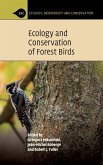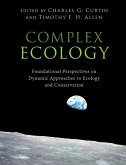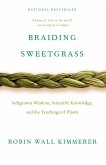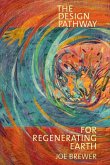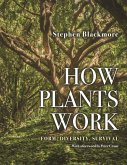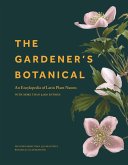Urban Planet
Herausgeber: Bai, Xuemei; Frantzeskaki, Niki; Elmqvist, Thomas
Urban Planet
Herausgeber: Bai, Xuemei; Frantzeskaki, Niki; Elmqvist, Thomas
- Gebundenes Buch
- Merkliste
- Auf die Merkliste
- Bewerten Bewerten
- Teilen
- Produkt teilen
- Produkterinnerung
- Produkterinnerung
Over 100 scientists, architects, journalists, artists and activists address creatively the unprecedented challenges facing an Urban Planet. This title is also available Open Access.
Andere Kunden interessierten sich auch für
![Ecology and Conservation of Forest Birds Ecology and Conservation of Forest Birds]() Ecology and Conservation of Forest Birds102,99 €
Ecology and Conservation of Forest Birds102,99 €![Complex Ecology Complex Ecology]() Complex Ecology60,99 €
Complex Ecology60,99 €![Braiding Sweetgrass Braiding Sweetgrass]() Robin Wall KimmererBraiding Sweetgrass16,99 €
Robin Wall KimmererBraiding Sweetgrass16,99 €![The Design Pathway for Regenerating Earth The Design Pathway for Regenerating Earth]() Joe BrewerThe Design Pathway for Regenerating Earth23,99 €
Joe BrewerThe Design Pathway for Regenerating Earth23,99 €![Braiding Sweetgrass Braiding Sweetgrass]() Robin Wall KimmererBraiding Sweetgrass31,99 €
Robin Wall KimmererBraiding Sweetgrass31,99 €![How Plants Work How Plants Work]() Stephen BlackmoreHow Plants Work31,99 €
Stephen BlackmoreHow Plants Work31,99 €![The Gardener's Botanical The Gardener's Botanical]() Ross BaytonThe Gardener's Botanical27,99 €
Ross BaytonThe Gardener's Botanical27,99 €-
-
-
Over 100 scientists, architects, journalists, artists and activists address creatively the unprecedented challenges facing an Urban Planet. This title is also available Open Access.
Hinweis: Dieser Artikel kann nur an eine deutsche Lieferadresse ausgeliefert werden.
Hinweis: Dieser Artikel kann nur an eine deutsche Lieferadresse ausgeliefert werden.
Produktdetails
- Produktdetails
- Verlag: Cambridge University Press
- Seitenzahl: 514
- Erscheinungstermin: 13. April 2018
- Englisch
- Abmessung: 250mm x 175mm x 32mm
- Gewicht: 1059g
- ISBN-13: 9781107196933
- ISBN-10: 1107196930
- Artikelnr.: 50448820
- Herstellerkennzeichnung
- Books on Demand GmbH
- In de Tarpen 42
- 22848 Norderstedt
- info@bod.de
- 040 53433511
- Verlag: Cambridge University Press
- Seitenzahl: 514
- Erscheinungstermin: 13. April 2018
- Englisch
- Abmessung: 250mm x 175mm x 32mm
- Gewicht: 1059g
- ISBN-13: 9781107196933
- ISBN-10: 1107196930
- Artikelnr.: 50448820
- Herstellerkennzeichnung
- Books on Demand GmbH
- In de Tarpen 42
- 22848 Norderstedt
- info@bod.de
- 040 53433511
Introduction
Part I. Dynamic Urban Planet: 1. Global urbanization: perspectives and trends
2. Embracing urban complexity
3. Understanding, implementing, and tracking urban metabolism is key to urban futures
4. Live with risk while reducing vulnerability
5. Harness urban complexity for health and wellbeing
6. Macro-economy and urban productivity
Part II. Global Urban Sustainable Development: 7. Rethinking urban sustainability and resilience
8. Indicators for measuring urban sustainable development and resilience
9. The UN, the urban sustainable development goal and the new urban agenda
10. Utilizing urban living laboratories for social innovation
11. Can big data make a difference for urban management?
12. Collaborative and equitable urban citizen science
Part III. Urban Transformations to Sustainability: 13. Sustainability transformation emerging from better governance
14. To transform cities, support civil society
15. Governance and the new politics of collaboration and contestation
16. Seeds of the future, found in the present
Part IV. Provocations from Practice: 17. Sustainability, Karachi, and other irreconcilables
18. What knowledge do the cities themselves need?
19. Banksy and the biologist: redrawing the twenty-first century city
20. Every community needs a forest of imagination
21. How can we shift from a imaged-based city to a life-based city?
22. A chimera called smart cities
23. Beyond fill-in-the-blank cities
24. Persuading policy makers to implement sustainable city plans
25. To live or not to live: urbanisation and the knowledge worker
26. City fragmentation and the commons
27. Cities as global organisms
28. From concrete structures to green diversity: ecological landscape design for restoring urban nature and children's play
29. Building cities: a view from India
30. The barking dog syndrome
31. Overcoming inertia and reinventing 'retreat'
32. Money for old rope
33. An aesthetic appreciation of tagging
34. Understanding Arab cities
35. Who can implement the sustainable development goals?
36. Achieving sustainable cities by focusing on urban underserved
37. The rebellion of memory
38. Cities don't need 'big' data - they need innovations that connect to the local
39. Digital urbanisation and the end of big cities
40. The art of engagement / activating curiosity
41. Nairobi's illegal city makers
42. Active environmental citizens with receptive government officials can enact change
43. The sea wall
44. Academics and non-academics: who's who in changing the culture of knowledge creation?
45. Private fears in public spaces
46. Leadership: science and policy as uncomfortable bedfellows
47. Sketches of an emotional geography towards a new citizenship
48. The shift in urban technology innovation
49. Greening cities: our pressing moral imperative
50. Recognition deficit and struggle for unifying city fragments
51. Disrespecting the knowledge of place
52. Broadening our vision to find a new eco-spiritual way of living.
Part I. Dynamic Urban Planet: 1. Global urbanization: perspectives and trends
2. Embracing urban complexity
3. Understanding, implementing, and tracking urban metabolism is key to urban futures
4. Live with risk while reducing vulnerability
5. Harness urban complexity for health and wellbeing
6. Macro-economy and urban productivity
Part II. Global Urban Sustainable Development: 7. Rethinking urban sustainability and resilience
8. Indicators for measuring urban sustainable development and resilience
9. The UN, the urban sustainable development goal and the new urban agenda
10. Utilizing urban living laboratories for social innovation
11. Can big data make a difference for urban management?
12. Collaborative and equitable urban citizen science
Part III. Urban Transformations to Sustainability: 13. Sustainability transformation emerging from better governance
14. To transform cities, support civil society
15. Governance and the new politics of collaboration and contestation
16. Seeds of the future, found in the present
Part IV. Provocations from Practice: 17. Sustainability, Karachi, and other irreconcilables
18. What knowledge do the cities themselves need?
19. Banksy and the biologist: redrawing the twenty-first century city
20. Every community needs a forest of imagination
21. How can we shift from a imaged-based city to a life-based city?
22. A chimera called smart cities
23. Beyond fill-in-the-blank cities
24. Persuading policy makers to implement sustainable city plans
25. To live or not to live: urbanisation and the knowledge worker
26. City fragmentation and the commons
27. Cities as global organisms
28. From concrete structures to green diversity: ecological landscape design for restoring urban nature and children's play
29. Building cities: a view from India
30. The barking dog syndrome
31. Overcoming inertia and reinventing 'retreat'
32. Money for old rope
33. An aesthetic appreciation of tagging
34. Understanding Arab cities
35. Who can implement the sustainable development goals?
36. Achieving sustainable cities by focusing on urban underserved
37. The rebellion of memory
38. Cities don't need 'big' data - they need innovations that connect to the local
39. Digital urbanisation and the end of big cities
40. The art of engagement / activating curiosity
41. Nairobi's illegal city makers
42. Active environmental citizens with receptive government officials can enact change
43. The sea wall
44. Academics and non-academics: who's who in changing the culture of knowledge creation?
45. Private fears in public spaces
46. Leadership: science and policy as uncomfortable bedfellows
47. Sketches of an emotional geography towards a new citizenship
48. The shift in urban technology innovation
49. Greening cities: our pressing moral imperative
50. Recognition deficit and struggle for unifying city fragments
51. Disrespecting the knowledge of place
52. Broadening our vision to find a new eco-spiritual way of living.
Introduction
Part I. Dynamic Urban Planet: 1. Global urbanization: perspectives and trends
2. Embracing urban complexity
3. Understanding, implementing, and tracking urban metabolism is key to urban futures
4. Live with risk while reducing vulnerability
5. Harness urban complexity for health and wellbeing
6. Macro-economy and urban productivity
Part II. Global Urban Sustainable Development: 7. Rethinking urban sustainability and resilience
8. Indicators for measuring urban sustainable development and resilience
9. The UN, the urban sustainable development goal and the new urban agenda
10. Utilizing urban living laboratories for social innovation
11. Can big data make a difference for urban management?
12. Collaborative and equitable urban citizen science
Part III. Urban Transformations to Sustainability: 13. Sustainability transformation emerging from better governance
14. To transform cities, support civil society
15. Governance and the new politics of collaboration and contestation
16. Seeds of the future, found in the present
Part IV. Provocations from Practice: 17. Sustainability, Karachi, and other irreconcilables
18. What knowledge do the cities themselves need?
19. Banksy and the biologist: redrawing the twenty-first century city
20. Every community needs a forest of imagination
21. How can we shift from a imaged-based city to a life-based city?
22. A chimera called smart cities
23. Beyond fill-in-the-blank cities
24. Persuading policy makers to implement sustainable city plans
25. To live or not to live: urbanisation and the knowledge worker
26. City fragmentation and the commons
27. Cities as global organisms
28. From concrete structures to green diversity: ecological landscape design for restoring urban nature and children's play
29. Building cities: a view from India
30. The barking dog syndrome
31. Overcoming inertia and reinventing 'retreat'
32. Money for old rope
33. An aesthetic appreciation of tagging
34. Understanding Arab cities
35. Who can implement the sustainable development goals?
36. Achieving sustainable cities by focusing on urban underserved
37. The rebellion of memory
38. Cities don't need 'big' data - they need innovations that connect to the local
39. Digital urbanisation and the end of big cities
40. The art of engagement / activating curiosity
41. Nairobi's illegal city makers
42. Active environmental citizens with receptive government officials can enact change
43. The sea wall
44. Academics and non-academics: who's who in changing the culture of knowledge creation?
45. Private fears in public spaces
46. Leadership: science and policy as uncomfortable bedfellows
47. Sketches of an emotional geography towards a new citizenship
48. The shift in urban technology innovation
49. Greening cities: our pressing moral imperative
50. Recognition deficit and struggle for unifying city fragments
51. Disrespecting the knowledge of place
52. Broadening our vision to find a new eco-spiritual way of living.
Part I. Dynamic Urban Planet: 1. Global urbanization: perspectives and trends
2. Embracing urban complexity
3. Understanding, implementing, and tracking urban metabolism is key to urban futures
4. Live with risk while reducing vulnerability
5. Harness urban complexity for health and wellbeing
6. Macro-economy and urban productivity
Part II. Global Urban Sustainable Development: 7. Rethinking urban sustainability and resilience
8. Indicators for measuring urban sustainable development and resilience
9. The UN, the urban sustainable development goal and the new urban agenda
10. Utilizing urban living laboratories for social innovation
11. Can big data make a difference for urban management?
12. Collaborative and equitable urban citizen science
Part III. Urban Transformations to Sustainability: 13. Sustainability transformation emerging from better governance
14. To transform cities, support civil society
15. Governance and the new politics of collaboration and contestation
16. Seeds of the future, found in the present
Part IV. Provocations from Practice: 17. Sustainability, Karachi, and other irreconcilables
18. What knowledge do the cities themselves need?
19. Banksy and the biologist: redrawing the twenty-first century city
20. Every community needs a forest of imagination
21. How can we shift from a imaged-based city to a life-based city?
22. A chimera called smart cities
23. Beyond fill-in-the-blank cities
24. Persuading policy makers to implement sustainable city plans
25. To live or not to live: urbanisation and the knowledge worker
26. City fragmentation and the commons
27. Cities as global organisms
28. From concrete structures to green diversity: ecological landscape design for restoring urban nature and children's play
29. Building cities: a view from India
30. The barking dog syndrome
31. Overcoming inertia and reinventing 'retreat'
32. Money for old rope
33. An aesthetic appreciation of tagging
34. Understanding Arab cities
35. Who can implement the sustainable development goals?
36. Achieving sustainable cities by focusing on urban underserved
37. The rebellion of memory
38. Cities don't need 'big' data - they need innovations that connect to the local
39. Digital urbanisation and the end of big cities
40. The art of engagement / activating curiosity
41. Nairobi's illegal city makers
42. Active environmental citizens with receptive government officials can enact change
43. The sea wall
44. Academics and non-academics: who's who in changing the culture of knowledge creation?
45. Private fears in public spaces
46. Leadership: science and policy as uncomfortable bedfellows
47. Sketches of an emotional geography towards a new citizenship
48. The shift in urban technology innovation
49. Greening cities: our pressing moral imperative
50. Recognition deficit and struggle for unifying city fragments
51. Disrespecting the knowledge of place
52. Broadening our vision to find a new eco-spiritual way of living.


